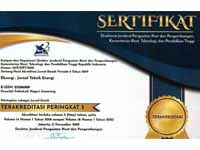ANALISIS PENGARUH KANDUNGAN KARBON TETAP PADA BATUBARA TERHADAP EFISIENSI KETEL UAP PLTU TANJUNG JATI B UNIT 2
DOI:
https://doi.org/10.32497/eksergi.v12i1.280Abstract
Ketel uap merupakan komponen utama dalam sistem pembangkit yang digunakan untuk mengubah fasa cair menjadi fasa uap. Agar pembangkit dapat dioperasikan secara kontinue ketel uap harus menggunakan jenis batu bara yang tepat sehingga efisiensi ketel uap tetap terjaga tinggi dan produksi listrik dapat terpenuhi. Penulisan artikel ini bertujuan untuk mengetahui pengaruh kandungan dari karbon tetap pada batu bara terhadap efisiensi dari ketel uap pada PLTU Tanjung Jati B Unit 2 antara tanggal 28 Juni 2012 hingga 20 Februari 2014. Untuk menghitung efisiensi ketel uap menggunakan metode kehilangan panas yang berdasarkan American Society of Mechanical Engineers Power Test Codes (ASME PTC) 4.1 Steam Generating Units dan 19.10 Flue And Exhaust Gasses Analyses. Hasil analisis menunjukan bahwa karakteristik efisiensi ketel uap terhadap kandungan karbontetap semakin menaik. Efisiensi ketel uap tertinggi adalah 89,91% pada saat nilai karbon tetap 44,84% dan efisiensi tetap 38,38%. Kenaikan efisiensi ketel uap rata-rata tiap ketel uap terendah adalah 88,36% pada saat nilai karbon 1% kenaikan karbon tetap adalah 0,2678%.
Kata kunci: efisiensi, ketel uap, metode kehilangan panas
Downloads
Published
Issue
Section
License
Authors who publish with this journal agree to the following terms:Authors retain copyright and grant the journal right of first publication with the work simultaneously licensed under a Creative Commons Attribution License that allows others to share the work with an acknowledgement of the work's authorship and initial publication in this journal.
Authors are able to enter into separate, additional contractual arrangements for the non-exclusive distribution of the journal's published version of the work (e.g., post it to an institutional repository or publish it in a book), with an acknowledgement of its initial publication in this journal.
Authors are permitted and encouraged to post their work online (e.g., in institutional repositories or on their website) prior to and during the submission process, as it can lead to productive exchanges, as well as earlier and greater citation of published work (See The Effect of Open Access).






